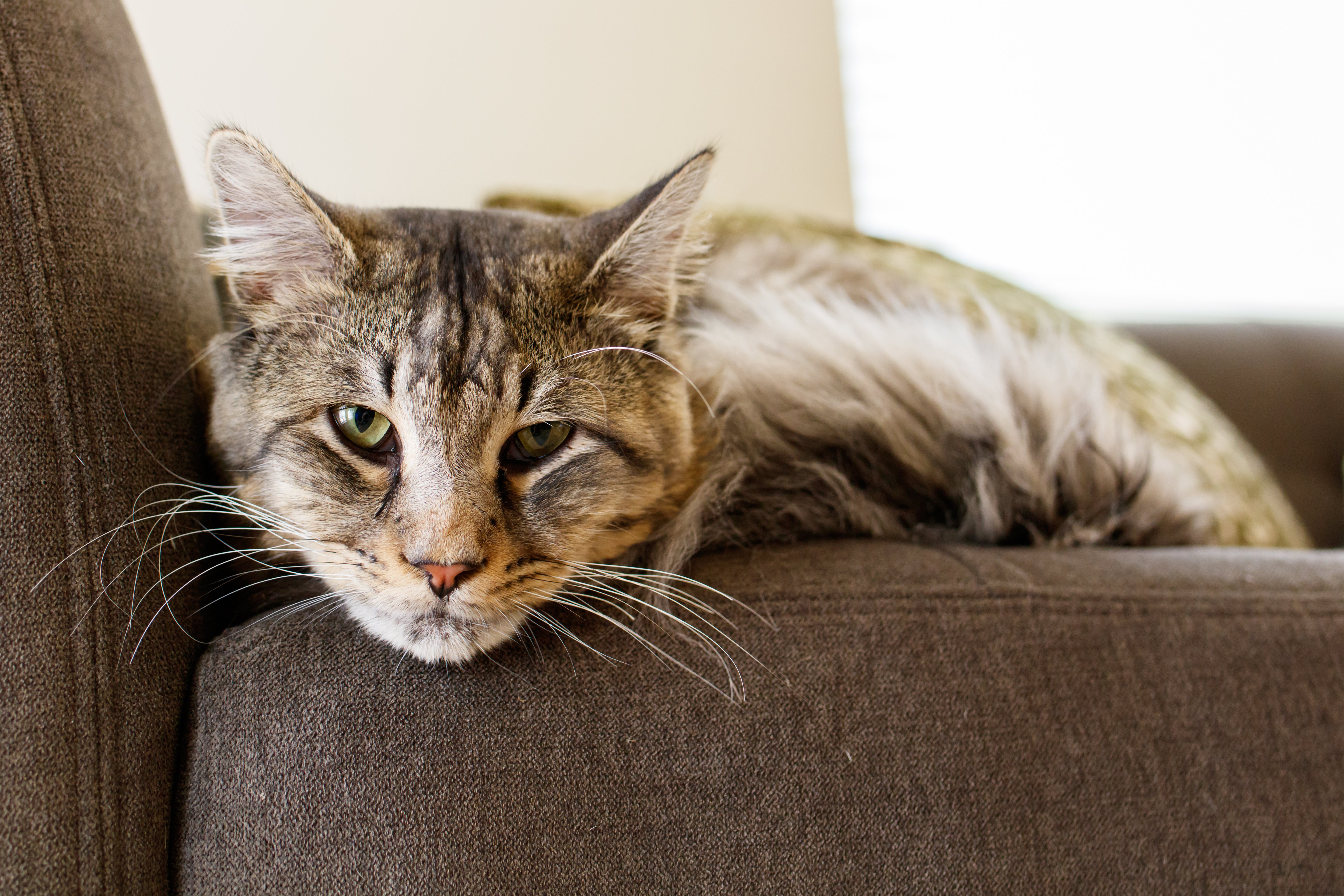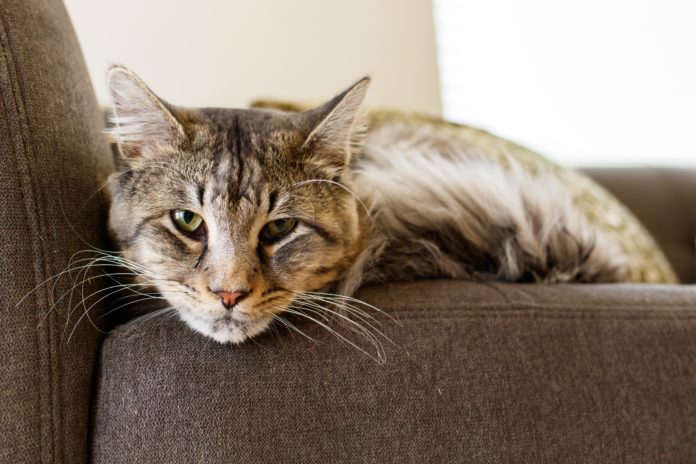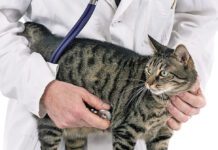Fotoluminate LLC | AdobeStock

The first indication of a heart problem in a kitten or cat might be a murmur picked up by your veterinarian on a routine physical examination. “Luckily, not all heart murmurs mean heart disease in cats,” says Dr. Bruce Kornreich DVM PhD, board-certified veterinary cardiologist and Associate Director of the Cornell Feline Health Center. Many ostensibly healthy cats have murmurs, but depending upon the situation, follow-up diagnostics may be warranted when a murmur is detected in a cat.
Your veterinarian will listen carefully with a stethoscope, check your cat’s blood pressure, and possibly do some bloodwork if a murmur is detected. Follow up diagnostic tests may include radiographs, electrocardiogram (ECG), or ultrasound evaluations, depending upon the initial examination.
Observant owners may pick up signs of heart problems in their cats early on in disease progression. “Increased respiratory rate (greater than 40 breaths per minute while sleeping), increased respiratory effort, loss of appetite, and lethargy could all possibly point toward a heart condition. Sudden hind limb paralysis (with thrombosis—a clot cutting off blood supply to the limbs) is often a sign of a serious heart problem as well,” says Dr. Kornreich.
The Most Common Heart Problem
Hypertrophic cardiomyopathy (HCM) is the most common heart problem in cats. The disease involves a thickening of the muscles of the heart, particularly the left ventricle.
Thicker walls mean less volume inside the heart chambers for blood. The heart has to beat faster to move enough oxygenated blood to all the tissues of the body, including the heart muscle itself. Eventually, affected cats may develop congestive heart failure, with fluid backup into the lungs.
Diagnosing HCM requires more than just an auscultation (listening with a stethoscope). Echocardiography, also called an echo sonogram, uses sound waves to look at the heart and is generally required. In addition, your veterinarian will want to measure your cat’s blood pressure and check her thyroid-hormone levels, as hyperthyroidism and high blood pressure can also cause thickening of the heart. Radiographs (X-rays) and an electrocardiogram (ECG), which records electrical activity in your cat’s heart, may also be recommended.
Cats with few clinical signs who are diagnosed early on with HCM and receive medical care can do well for years. However, the development of congestive heart failure (CHF) worsens the prognosis. “Cats with asymptomatic HCM can live high quality lives for many years, while those in CHF generally survive between three and 18 months, depending upon therapy used,” says Dr. Kornreich.
Treatments
Managing heart disease in your cat comes down to medical care. Your veterinarian will advise you on which medications are best for your cat. Commonly used drugs include diuretics to alleviate congestion, angiotensin-converting enzyme (ACE) inhibitors to relax and dilate blood vessels, and antithrombotic drugs to reduce the likelihood of clot formation. Medications can usually be given orally, but some may require injections depending upon a cat’s clinical status.
Dr. Kornreich says the use of pimobendan, while still off-label for cats (only FDA-approved for dogs at this time), appears to confer a survival benefit to cats with HCM that have developed left-sided CHF. Pimobendan improves the ability of the heart to pump blood forward and dilates blood vessels. Discuss the use of this medication with your veterinarian.
You may be told to adjust your cat’s diet, too. If your cat has congestive heart failure, a diet with a low sodium content might be helpful, although this is controversial. Obesity may also predispose cats to cardiomyopathy, so weight control is important. All cats need adequate taurine in their diets, as this amino acid has been associated with another form of cardiomyopathy (dilated cardiomyopathy) in cats. Most commercial diets contain appropriate amounts of taurine, but if you’re not feeding a commercial diet, you want to ensure this is covered.
Prevention
Can you prevent heart disease in your cat? Yes and no.
If your cat has one of the gene mutations predisposing him to HCM, he may have a higher risk of developing heart disease than cats without these mutations, and selective breeding programs have the potential to decrease the prevalence of heart disease in cats. Both high blood pressure and hyperthyroidism can cause secondary changes to the hearts of affected cats, so treating these conditions if they are diagnosed is important.
Kittens may be born with congenital (present at birth) heart defects. The most common ones involve problems with the valves of the heart or holes in the wall separating the right and left ventricles of the heart. Either of these problems can result in inefficient delivery of oxygenated blood to the body tissues. Luckily, congenital heart defects are not common in cats (affecting only 0.2 percent of all cats and 8 percent of those diagnosed with heart disease). Minor defects may not shorten a cat’s life span or negatively affect quality of life, while severe ones could mean a shortened lifespan and/or diminished quality of life.
Keep your cat at an appropriate weight and encourage him to be active. Feed a quality diet. Talk to your veterinarian about whether heartworm prevention is appropriate—and yes, indoor cats can get heartworm too!
If your cat shows any abnormal behaviors, write down details about the incident, including the time and any potential influencing factors. If you catch heart problems early, treatment is more successful and your cat will have a better chance of leading a high quality life.
If you are purchasing a purebred kitten, ask about DNA testing and evaluations of the parents for heart diseases. If you are adopting a kitten, be sure he gets a full physical examination as soon as possible in case a congenital problem is present.




